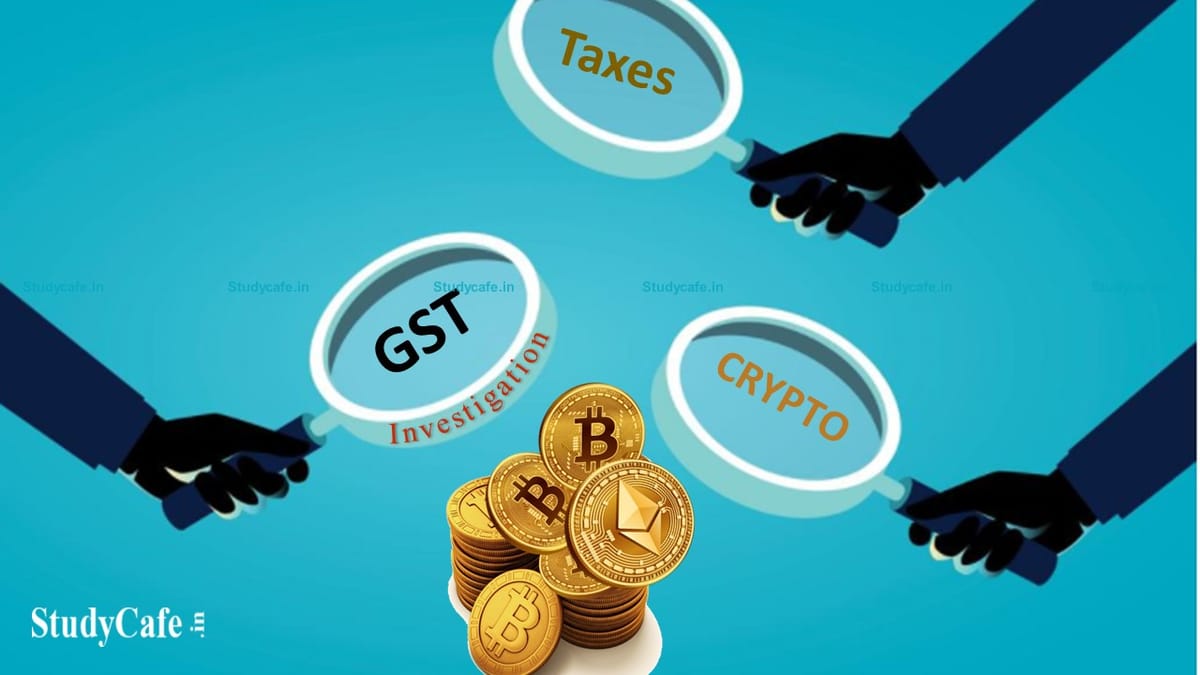Reetu | Jan 4, 2022 |

GST investigation can set a precedent for crypto taxes
While the indirect tax department launched investigations into many crypto exchanges for allegedly avoiding GST duty, it may have also set a precedent for how crypto assets are classified for taxation.
Legal experts have long disagreed over how cryptocurrencies should be classified — and how they should be taxed. They are still debating whether a cryptocurrency is a currency, a commodity, a service, or something else else.
Several crypto exchanges were searched and raided by the Directorate General of GST Intelligence (DGGI), who demanded that they pay GST on their transaction fees or margins.
According to tax experts, the tax department’s position could suggest that at least some of what exchanges provide can be classified as services. “From a taxability and value standpoint, GST on cryptocurrencies has been a source of contention,” said Abhishek A Rastogi, Partner at & Co. “Senders always pay transaction fees; they will be taken into account because they are made in cryptocurrency in response to the recipient of services’ supply of services, and cryptocurrencies are rewarded by the blockchain system to crypto miners on successful transaction verification.”
The tax department’s proposal to levy an 18 percent GST on exchange margins and services is similar to what commodity exchanges and other intermediaries in India must pay.
The issue is causing confusion among cryptocurrency exchanges. “At the moment, there are no crypto-specific provisions in the GST and Income tax legislation,” said Sumit Gupta, Co-founder and CEO of CoinDCX. “However, we are seeing clarity on the tax interpretations and are abiding by an 18 percent GST on the exchange profits from fees and various charges.”
“There was some ambiguity in the interpretation, so we obliged and paid GST willingly.” “We have always been and will continue to be tax-compliance-compliant,” a WazirX spokeswoman stated.
WazirX, CoinSwitch, Kuber, and CoinDCX are among the major exchanges under investigation by DGGI.
Even industry groups agree the tax department’s position is justified and will merely add to the confusion.
“The department (Tax) wants to make sure that all of the brokerage/commission received by exchanges has been subjected to GST at 18 percent,” said Vikas Ahuja, a member of the Blockchain and Crypto Assets Council (BACC).
“The main concerns that certain Indian crypto exchanges had were related to the commissions charged by some exchanges while transacting using their native cryptocurrency.” “An Indian exchange, for example, might allow users to transact in INR or their national token,” said Edul Patel, Mudrex’s CEO and co-founder.
The amount of tax charged on cryptocurrencies under income tax or GST legislation is still unknown. This is due to the ambiguity surrounding the classification of cryptocurrencies such as Bitcoin and other assets.
Many exchanges have begun to state that the entire problem is mostly about compliance and that they support the taxman’s position. “There is a lot of misunderstanding about the taxation of crypto assets and filing procedures in India right now,” Shivam Thakral, CEO of BuyUcoin, stated.
Income tax rates on returns from diverse assets are separate and range from 10% to 35 percent, depending on whether they can be considered similarly to money, equity, gold, technology, services, or like a lottery. Depending on the category, GST rates could range from 0% to 28%.
This isn’t the first time the Bitcoin has come under scrutiny from tax authorities. Top executives and promoters of various cryptocurrency exchanges were requested to explain their business strategy and how much indirect tax – either service tax or value-added tax – could be assessed during tax examinations in 2017.
The tax authorities wanted to know how they could tax the revenue generated by the exchanges.
The issue wasn’t just about sales tax and VAT, but also about how bitcoins could be classified under GST.
In case of any Doubt regarding Membership you can mail us at contact@studycafe.in
Join Studycafe's WhatsApp Group or Telegram Channel for Latest Updates on Government Job, Sarkari Naukri, Private Jobs, Income Tax, GST, Companies Act, Judgements and CA, CS, ICWA, and MUCH MORE!"